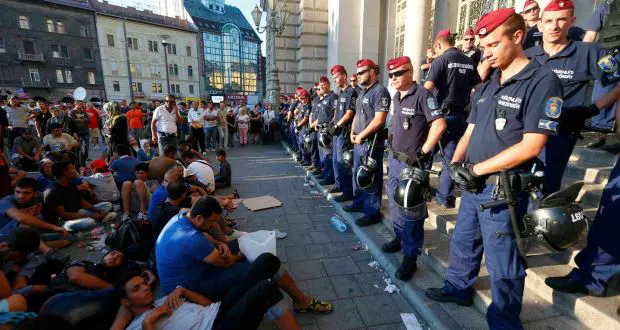The stormy debate around the refugee crisis, which reopened here Tuesday at the plenary session of the European Parliament, made clear the stalemate in which the European Union (EU) finds itself, as well as the growing schism between its member states facing a serious threat to the Schengen Zone.
European Council President Donald Tusk set the tone at the opening of the debate by declaring, "We have no more than two months to find a solution."
Following disappointing outcomes at the European Summit of last Dec. 17-18, he conceded that, "despite political progress, I have to admit there is a clear delivery deficit on many fronts."
The last meeting of European leaders in 2015 had once again failed to find a real agreement and led to many disappointments. The only consensus found was the necessity to "stem the flux" of migrants and to "regain control of exterior borders," even without the creation of a European border guard organization coming into place.
"We don't stop repeating ourselves! Everything is collapsing because the member states won't make a decision," said the German leader of the Liberal Group Guy Verhofstadt before firmly confronting the European Council president: "If Germany also decided tomorrow to no longer apply Schengen, we could perhaps find ourselves without a Union at all!"
Several of his fellow group leaders also thrashed against the inaction of the EU and were alarmed by the deleterious moral, social and political climate that has taken over among its member states.
Germany, Austria and Sweden, which have previously advocated generous welcome policies for migrants, have made U-turns in their language, notably under pressure from public opinion following New Year's Eve events in Cologne, in which migrants have been accused of sexual violence.
Several Members of European Parliament (MEPs) have not hesitated to refer to the events as a "clash of civilizations."
After Hungary's construction of a wall along its border with Serbia last summer, other barriers have been erected in various parts of Europe, such as in Slovenia, Austria and Bulgaria.At the same time, interior border controls have reappeared in
the EU, including in Germany and Sweden. Vienna recently announced that staring next week, it will no longer allow asylum seekers transit through its territory, refugees having often crossed Austria as they try to reach Scandinavian countries.
"Fortress Europe" is no longer just a concept, but also a reality which imposes itself further on the Old Continent every day.
Poland, Hungary, Slovakia and the Czech Republic refuse to support discussion of a distribution mechanism for refugees, even one decided upon by the different organs of the EU.
The situation is even more worrying since, after the arrival of more than one million migrants on European soil in 2015, nothing indicates that the flux of migrants will subside.
Despite the "action plan" signed between Brussels and Ankara last November which provides for 3 billion euros (3.27 billion U.S. dollars) in European aid for Turkish authorities in exchange for their commitment to better control their borders and to cooperate in the fight against traffickers, the migratory flux toward the EU from Turkey has remained "far too high," deplored Vice-President of the European Commission Frans Timmermans last week.
Beyond the East-West fracture which has become markedly clear, the ideological divisions have become more and more flagrant between supporters of a global response and those for whom, following the example of the euroskeptic Nigel Farage, only a return to sovereignty will make it possible to confront the refugee crisis.
Next June, British citizens may vote in a referendum on their wish to stay in the EU or leave it permanently. The reality of a "Brexit" would throw the EU into a crisis that has up until now been without precedent. Undeniably, 2016 will be a year full of dangers for the survival of the EU.
 简体中文
简体中文

